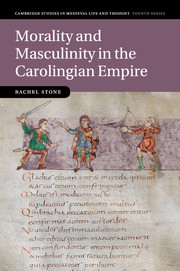Book contents
- Frontmatter
- Contents
- Illustrations
- Acknowledgements
- A note on translation
- Abbreviations
- The Carolingian empire
- Genealogy of Carolingian rulers
- Chapter 1 Introduction
- Chapter 2 Moral texts and lay audiences
- Chapter 3 Warfare
- Chapter 4 Imagining power
- Chapter 5 Central power
- Chapter 6 Personal power
- Chapter 7 Power and wealth
- Chapter 8 Marriage
- Chapter 9 Sex
- Chapter 10 Men and morality
- Bibliography
- Index
Chapter 2 - Moral texts and lay audiences
Published online by Cambridge University Press: 05 November 2011
- Frontmatter
- Contents
- Illustrations
- Acknowledgements
- A note on translation
- Abbreviations
- The Carolingian empire
- Genealogy of Carolingian rulers
- Chapter 1 Introduction
- Chapter 2 Moral texts and lay audiences
- Chapter 3 Warfare
- Chapter 4 Imagining power
- Chapter 5 Central power
- Chapter 6 Personal power
- Chapter 7 Power and wealth
- Chapter 8 Marriage
- Chapter 9 Sex
- Chapter 10 Men and morality
- Bibliography
- Index
Summary
Any discussion of early medieval moral instruction must grapple with the question of whether lay noblemen actually read or heard the advice given. Were Carolingian moralists simply casting their work into a void? This issue has been approached from several different angles. Rosamond McKitterick and Janet Nelson have argued for relatively widespread lay literacy in the Carolingian period. Thomas Noble has assembled evidence for nobles receiving moral messages both orally and in writing. Many studies of individual Carolingian texts provide information on their audience and circulation. This chapter offers a synthesis of this research, giving an overview of the wide range of moral texts that might inculcate norms in lay noblemen.
My focus is on works written in Latin within the Carolingian empire in the period from c. 750 to c. 900: material from Italy and Bavaria before their conquest is therefore not included. I have not looked at the much smaller number of Continental vernacular texts from the period. The earliest texts discussed in this book are Boniface’s letters and the conciliar legislation of Carloman and Pippin III, the starting point for Carolingian attempts at reform.
- Type
- Chapter
- Information
- Morality and Masculinity in the Carolingian Empire , pp. 27 - 68Publisher: Cambridge University PressPrint publication year: 2011



